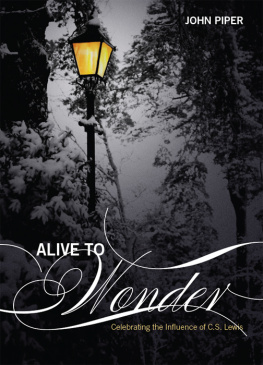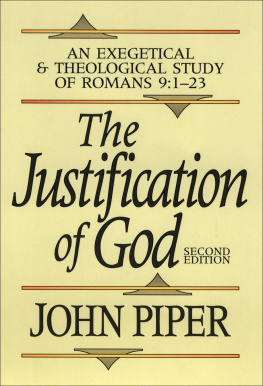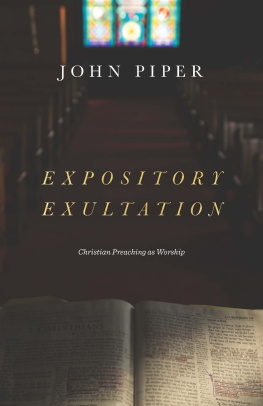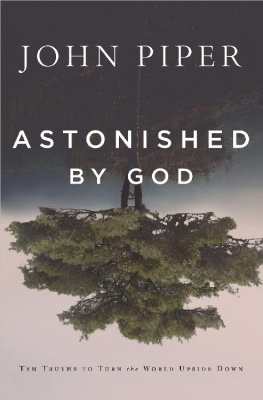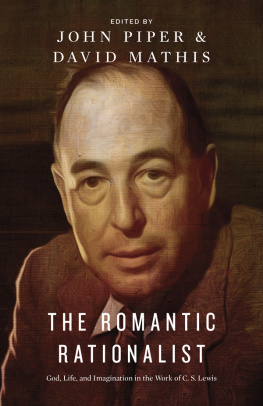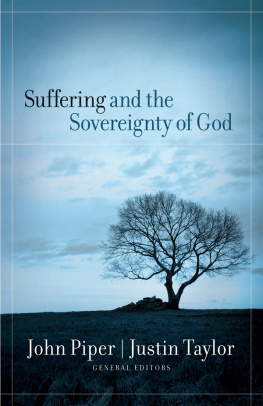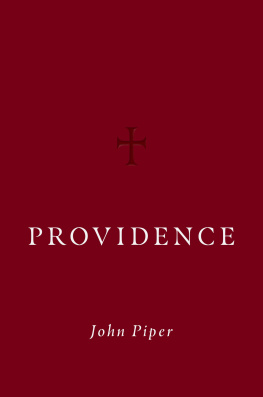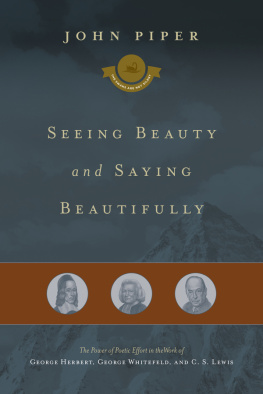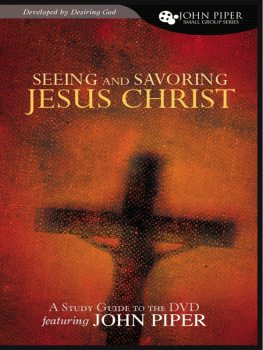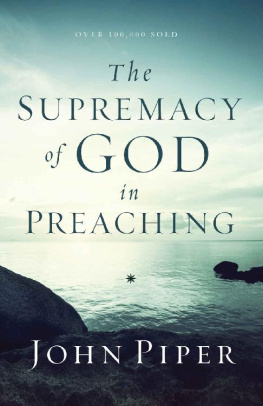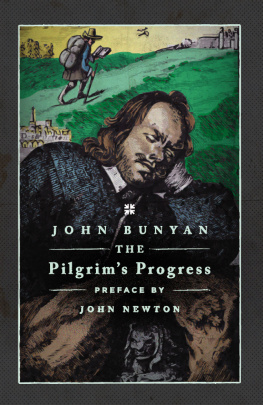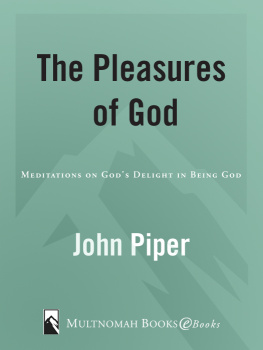John Piper - Alive to Wonder Celebrating the Influence of C.S. Lewis
Here you can read online John Piper - Alive to Wonder Celebrating the Influence of C.S. Lewis full text of the book (entire story) in english for free. Download pdf and epub, get meaning, cover and reviews about this ebook. year: 2013, publisher: Desiring God, genre: Religion. Description of the work, (preface) as well as reviews are available. Best literature library LitArk.com created for fans of good reading and offers a wide selection of genres:
Romance novel
Science fiction
Adventure
Detective
Science
History
Home and family
Prose
Art
Politics
Computer
Non-fiction
Religion
Business
Children
Humor
Choose a favorite category and find really read worthwhile books. Enjoy immersion in the world of imagination, feel the emotions of the characters or learn something new for yourself, make an fascinating discovery.
- Book:Alive to Wonder Celebrating the Influence of C.S. Lewis
- Author:
- Publisher:Desiring God
- Genre:
- Year:2013
- Rating:4 / 5
- Favourites:Add to favourites
- Your mark:
- 80
- 1
- 2
- 3
- 4
- 5
Alive to Wonder Celebrating the Influence of C.S. Lewis: summary, description and annotation
We offer to read an annotation, description, summary or preface (depends on what the author of the book "Alive to Wonder Celebrating the Influence of C.S. Lewis" wrote himself). If you haven't found the necessary information about the book — write in the comments, we will try to find it.
Alive to Wonder Celebrating the Influence of C.S. Lewis — read online for free the complete book (whole text) full work
Below is the text of the book, divided by pages. System saving the place of the last page read, allows you to conveniently read the book "Alive to Wonder Celebrating the Influence of C.S. Lewis" online for free, without having to search again every time where you left off. Put a bookmark, and you can go to the page where you finished reading at any time.
Font size:
Interval:
Bookmark:
2013 Desiring God
Published by Desiring God
Post Office Box 2901
Minneapolis, MN 55402
www.desiringGod.org
Permissions
You are permitted and encouraged to reproduce and distribute this material in any format provided that you do not alter the wording in any way and do not charge a fee beyond the cost of reproduction. For web posting, a link to this document on our website is preferred. Any exceptions to the above must be approved by Desiring God.
Please include the following statement on any distributed copy:
Desiring God. Website: desiringGod.org
Excerpts are taken from Desiring God, revised edition, (Multnomah, 2011); The Pleasures of God, revised edition, (Multnomah, 2013); When I Dont Desire God, Crossway, 2004); and www.desiringGod.org.
Unless otherwise indicated, Scripture quotations are from the ESV Bible (The Holy Bible, English Standard Version), copyright 2001 by Crossway. Used by permission. All rights reserved.
All emphases in Scripture quotations have been added by the author.

John Piper
C.S. Lewis died fifty years ago this year. More than a generation after his death, Lewiss works are now more popular and widely read than at any point during his lifetime.
I put Lewis in the top three writers who have influenced how I read and respond to the world. Yes, the world is a book to be read. And few people could read like Lewis. When Clyde Kilby wrote an anthology of Lewiss writings he titled it A Mind Awake. He might have called it An Awakening Mind. This is the effect it has. His alertness to reality is contagious.
My tribute to Lewis is scattered all through my writings and sermons. I want to thank Jonathan Parnell for gathering together all the parts of this book and providing the editorial sutures that transform them into a readable flow. This is our celebration of Lewiss extraordinary gift of being Awake to Wonder.
The Magisterial Humility of C.S. Lewis
One way to appreciate C.S. Lewis is to see how his Christian humility shaped his life and work. Owen Barfield, one of Lewiss closest friends, said that the new voice with which he spoke after his conversion had an unmistakable note of magisterial humility.
What does magisterial humility look like? That is what this introduction is about.
Self-Forgetfulness
I first met Lewiss humility embodied in one of his foremost American advocates in the 1960s, Clyde Kilby. Dr. Kilby taught English Literature at Wheaton College for 46 years. He carried on a personal correspondence with Lewis from 1943 until Lewis died in 1963. This correspondence became the seed for the personal papers of the Lewis circle (the Inklings) which Kilby gathered in the founding of the Marion E. Wade Center at Wheaton College.
Kilby was utterly disinterested in himself, and was full of love for God and his stunning gifts in the world of nature and literature. This was Kilbys gift to peoplehis love for them. He would come into class, open his Bible, and begin to read Job 39,
Is it by your understanding that the hawk soars
and spreads his wings toward the south?
Is it at your command that the eagle mounts up
and makes his nest on high? (Job 39:2627)
His smile would burst into laughter. And his eyes would sparkle and when he looked up at us his countenance would say, Have you seen this? Did you know this? Isnt this amazing? Do you have eyes for this? Then he would turn to John Keats and read To Autumn,
Season of mists and mellow fruitfulness
Close bosom-friend of the maturing sun
Conspiring with him how to load and bless
With fruit the vines that round the thatch-eaves run
And he would say, If you memorize this, it will bring you great pleasure when you are old. I dont think I ever heard Clyde Kilby make a comment about the subjective states of Clyde Kilby. He was a wonderfully healthy incarnation of self-forgetfulness.
Years later, Dr. Kilby came to Minneapolis and gave a self-reflective list of steps to mental health. But, as expected, the list included:
I shall not demean my own uniqueness by envy of others. I shall stop boring into myself to discover what psychological or social categories I might belong to. Mostly I shall simply forget about myself and do my work.
This healthy, humble gift of self-forgetfulness Dr. Kilby shared with C.S. Lewis. There is so much greatness to be known and felt by looking at God and his world, they believed, why would we focus on ourselves? Walter Hooper, Lewiss secretary, said,
Although Lewis owned a huge library, he possessed few of his own works. His phenomenal memory recorded almost everything he had read except his own writingsan appealing fault. Often when I quoted lines from his own poems he would ask who the author was. He was a very great scholar, but no expert in the field of C.S. Lewis.
The Real Business of Life
In diminishing his own preoccupation with himself, Lewiss humility enabled him to see what was really valuable, even when it was not his own literary vocation. How many prominent literary men are willing to speak the truth that Lewis spoke so plainly?
The Christian knows from the outset that the salvation of a single soul is more important than the production or preservation of all the epics and tragedies in the world: and as for superiority, he knows that the vulgar since they include most of the poor probably include most of his superiors.
Lewis had no time for those who called literature an end in itself, or thought that literature existed for its own sake.
It is hard not to argue that all the greatest poems have been made by men who valued something else much more than poetryeven if that something else were only cutting down enemies in a cattle-raid or tumbling a girl in bed. The real frivolity, the solemn vacuity, is all with those who make literature a self-existent thing to be valued for its own sake.
Nothing but God exists for its own sake. Lewiss humility prevents him from defending his own turf as he tackles the question, What is the value of culture? He knows what the answer is not: No one, presumably, is really maintaining that a fine taste in the arts is a condition of salvation. Yet the glory of God, and, as our only means to glorifying him, the salvation of human souls, is the real business of life.
His humility inclines him to speak in tune with ultimate authority, the Bible: I think we can still believe culture to be innocent after reading the New Testament; I cannot see that we are encouraged to think it is important. Yet, he says, it is important. It has a modest place in life:
I conclude that culture has a distinct part to play in bringing certain souls to Christ. Not all soulsthere is a shorter, and safer way which has always been followed by thousands of simple affectional natures who begin, where we hope to end, with devotion to the person of Christ.
Keep in mind, these are words coming from a man whom even his critics said was the best read man of his generation, one who read everything and remembered everything he read.
Simply Being
Behind these expressions of humility lay a very simple, powerful, basic humility concerning beingthe humility that admits, submits to, and rejoices in the fact that things exists outside oneself. To put it another way, Lewiss humility inclined him to believe he was not the measure of all things, but that objective and ultimate reality existed outside him, and did not depend on him for their existence or meaning.
Ultimate relativism, nihilism, and post-modernism are all forms of pride. If there is no objective reality outside of me, then I dont have to submit to it. Lewis thought that such views would mean the abolition of man. In a book by that title he defended the doctrine of objective value, the belief that certain attitudes are really true, and others really false to the kind of thing the universe is and the kind of things we are. So Lewis devoted his life not to creating reality, but to seeing it and saying it well.
Next pageFont size:
Interval:
Bookmark:
Similar books «Alive to Wonder Celebrating the Influence of C.S. Lewis»
Look at similar books to Alive to Wonder Celebrating the Influence of C.S. Lewis. We have selected literature similar in name and meaning in the hope of providing readers with more options to find new, interesting, not yet read works.
Discussion, reviews of the book Alive to Wonder Celebrating the Influence of C.S. Lewis and just readers' own opinions. Leave your comments, write what you think about the work, its meaning or the main characters. Specify what exactly you liked and what you didn't like, and why you think so.

